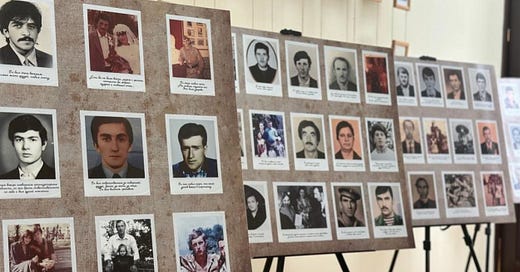"About two thousand are listed as missing from the war"
On August 30th, the world annually observes the International Day of the Victims of Enforced Disappearances.

Ekho Kavkaza, by Vitaly Sharia (30 August) —Today, Abkhazia, like the rest of the world, observed the International Day of the Disappeared. Memorial ceremonies took place in Sukhum. Boris Kazanba, Deputy Head of the ICRC mission in Abkhazia, estimates that since the early 90s, roughly two thousand individuals from both sides remain unaccounted for. This international organisation continues its efforts to ascertain their fate.
Globally, today marks the International Day of the Victims of Enforced Disappearances, also known as the Day of the Disappeared. Established to highlight the plight of those detained and whose whereabouts remain unknown, the day also emphasises the importance of searching for the disappeared. The initiative to recognize this day originated in 1983 from the Latin American Federation of Associations for Relatives of the Detained-Disappeared.
In Abkhazia, every August 30th is exclusively celebrated as the Day of the Disappeared. The overwhelming majority on the Abkhazian list are people who disappeared during the Patriotic War of the People of Abkhazia [Georgian-Abkhazian War] in 1992-1993.
Immediately after the armed conflict, by order of the first president of Abkhazia, Vladislav Ardzinba, a Commission on the Affairs of the Disappeared was established, which collected information and also conducted negotiations with the Georgian side regarding the burial of those who died during the war.
+ Sukhum Commemorates the Disappeared on International Day of Remembrance
E-Library
Discordant Neighbours: A Reassessment of the Georgian-Abkhazian and Georgian-South Ossetian Conflicts, by George Hewitt
Brill, 2013
The 2008 Georgian-Russian war focused the world’s attention on the Caucasus. South Ossetia and Abkhazia had been de facto independent since the early 1990s. However, Russia’s granting of recognition on 26 August 2008 changed regional dynamics.
The Caucasus is one of the most ethnically diverse areas on earth, and the conflicts examined here present their own complexities. This book sets the issues in their historical and political contexts and discusses potential future problems.
This volume is distinguished from others devoted to the same themes by the extensive use the author (a Georgian specialist) makes of Georgian sources, inaccessible to most commentators. His translated citations thus cast a unique and revealing light on the interethnic relations that have fuelled these conflicts.
B. George Hewitt, Ph.D. (1982) in Linguistics, University of Cambridge, FBA, is Professor of Caucasian Languages at SOAS (London University). He has published widely on Georgian and other Caucasian languages (notably Abkhaz) and has written extensively on the Georgian-Abkhazian conflict.
The full book in PDF can be downloaded by clicking here (3.7 MB)




